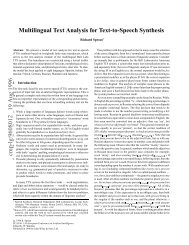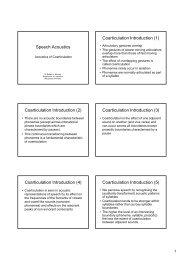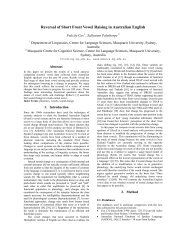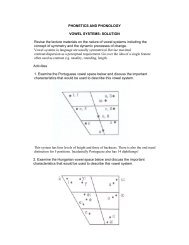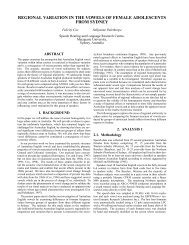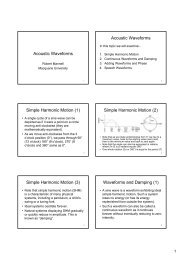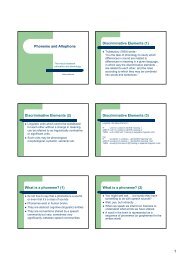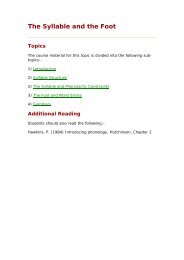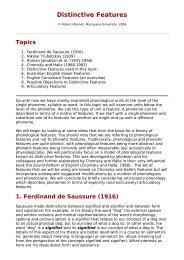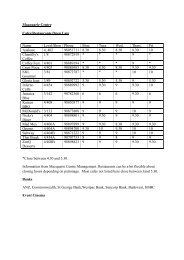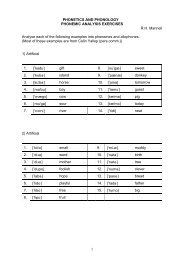Festival Speech Synthesis System: - Speech Resource Pages
Festival Speech Synthesis System: - Speech Resource Pages
Festival Speech Synthesis System: - Speech Resource Pages
You also want an ePaper? Increase the reach of your titles
YUMPU automatically turns print PDFs into web optimized ePapers that Google loves.
Building the models and getting good figures is only one part of the process. You must integrate this model into<br />
<strong>Festival</strong> if its going to be of any use. In the case of CART trees generated by Wagon, <strong>Festival</strong> supports these directly.<br />
In the case of CART trees predicting zscores, or factors to modify duration averages, ees can be used as is.<br />
Note there are other options to Wagon which may help build better CART models. Consult the chapter in the speech<br />
tools manual on Wagon for more information.<br />
Other parts of the distributed system use CART trees, and linear regression models that were training using the<br />
processes described in this chapter. Some other parts of the distributed system use CART trees which were written by<br />
hand and may be improved by properly applying these processes.<br />
[ < ] [ > ] [ > ] [Top] [Contents] [Index] [ ? ]<br />
27. Programming<br />
This chapter covers aspects of programming within the <strong>Festival</strong> environment, creating new modules, and modifying<br />
existing ones. It describes basic Classes available and gives some particular examples of things you may wish to add.<br />
27.1 The source code A walkthrough of the source code<br />
27.2 Writing a new module Example access of an utterance<br />
[ < ] [ > ] [ > ] [Top] [Contents] [Index] [ ? ]<br />
27.1 The source code<br />
The ultimate authority on what happens in the system lies in the source code itself. No matter how hard we try, and<br />
how automatic we make it, the source code will always be ahead of the documentation. Thus if you are going to be<br />
using <strong>Festival</strong> in a serious way, familiarity with the source is essential.<br />
The lowest level functions are catered for in the Edinburgh <strong>Speech</strong> Tools, a separate library distributed with <strong>Festival</strong>.<br />
The Edinburgh <strong>Speech</strong> Tool Library offers the basic utterance structure, waveform file access, and other various<br />
useful low-level functions which we share between different speech systems in our work. See section `Overview' in<br />
Edinburgh <strong>Speech</strong> Tools Library Manual.<br />
The directory structure for the <strong>Festival</strong> distribution reflects the conceptual split in the code.<br />
`./bin/'<br />
The user-level executable binaries and scripts that are part of the festival system. These are simple symbolic<br />
links to the binaries or if the system is compiled with shared libraries small wrap-around shell scripts that set<br />
LD_LIBRARY_PATH appropriately<br />
`./doc/'<br />
This contains the texinfo documentation for the whole system. The `Makefile' constructs the info and/or<br />
html version as desired. Note that the festival binary itself is used to generate the lists of functions and<br />
variables used within the system, so must be compiled and in place to generate a new version of the<br />
documentation.<br />
`./examples/'<br />
This contains various examples. Some are explained within this manual, others are there just as examples.<br />
`./lib/'<br />
The basic Scheme parts of the system, including `init.scm' the first file loaded by festival at start-up<br />
time. Depending on your installation, this directory may also contain subdirectories containing lexicons,<br />
voices and databases. This directory and its sub-directories are used by <strong>Festival</strong> at run-time.<br />
`./lib/etc/'<br />
Executables for <strong>Festival</strong>'s internal use. A subdirectory containing at least the audio spooler will be



